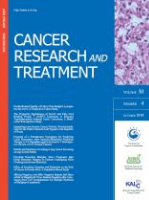
Cancer Research and Treatment
Scope & Guideline
Advancing knowledge, transforming cancer care.
Introduction
Aims and Scopes
- Clinical Research in Oncology:
The journal publishes significant clinical studies that explore innovative therapeutic approaches, clinical trials, treatment efficacy, and real-world outcomes in various cancer types. - Molecular and Genetic Insights:
Research focusing on the molecular and genetic underpinnings of cancer, including genomics, proteomics, and biomarker discovery, is a core aspect of the journal's publication scope. - Multidisciplinary Approaches to Cancer Treatment:
The journal embraces a multidisciplinary approach, incorporating perspectives from medical oncology, radiation oncology, surgical oncology, and supportive care to provide comprehensive treatment strategies. - Health Policy and Cancer Epidemiology:
It includes studies on cancer epidemiology, health policy, and patient-centered care, emphasizing the impact of socio-economic factors on cancer incidence and outcomes. - Innovative Therapeutic Techniques:
The journal highlights advancements in treatment modalities, including immunotherapy, targeted therapy, and novel drug delivery systems, aiming to improve therapeutic effectiveness and patient quality of life.
Trending and Emerging
- Next-Generation Sequencing and Precision Medicine:
There is a significant increase in studies utilizing next-generation sequencing technologies to guide personalized treatment strategies, reflecting a broader trend towards precision medicine in oncology. - Immunotherapy Advances:
Research focused on immunotherapy, including checkpoint inhibitors and CAR-T cell therapy, is gaining prominence as a leading treatment modality for various cancers, showcasing innovative approaches to harness the immune system. - Real-World Evidence Studies:
The journal is increasingly publishing real-world evidence studies that assess treatment outcomes and patient experiences outside of clinical trials, providing valuable insights into the effectiveness of therapies in diverse populations. - Health Disparities and Socioeconomic Factors:
Emerging themes include the exploration of health disparities and the impact of socioeconomic factors on cancer incidence and treatment outcomes, highlighting the need for equitable healthcare access. - Tumor Microenvironment Research:
There is a growing emphasis on understanding the tumor microenvironment and its role in cancer progression and treatment response, indicating a shift towards more integrative and holistic research approaches.
Declining or Waning
- Traditional Chemotherapy Studies:
There has been a noticeable decrease in publications centered on traditional chemotherapy alone, as the focus shifts towards personalized medicine and combination therapies that integrate targeted and immunotherapeutic approaches. - Localized Cancer Studies:
Research focused solely on localized cancer treatment without considering systemic or comprehensive care approaches is decreasing, indicating a trend towards more holistic cancer care models. - Basic Science Research:
The journal has seen fewer basic science studies that do not directly translate into clinical applications, reflecting a preference for translational research that bridges laboratory findings and clinical practice. - Single-Institution Studies:
The prevalence of studies conducted in single institutions is declining, with a shift towards multicenter and national studies that provide broader insights and enhance the generalizability of findings. - Survivorship and Palliative Care Research:
While still important, the volume of research specifically dedicated to survivorship and palliative care has diminished, as the journal emphasizes more on active treatment and innovative therapeutic strategies.
Similar Journals
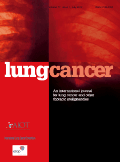
LUNG CANCER
Innovating Solutions for Lung Cancer ChallengesLUNG CANCER, published by Elsevier Ireland Ltd, is a pivotal academic journal dedicated to advancing knowledge in the fields of Cancer Research, Oncology, and Pulmonary and Respiratory Medicine. With an impressive impact factor reflected by its Q1 ranking across three key categories for 2023, this journal occupies a prestigious position within the research community, emphasizing quality and significance in published works. Since its inception in 1985, LUNG CANCER has provided a comprehensive platform for researchers and clinicians to disseminate findings and novel insights, enhancing the understanding and treatment of lung cancer. The journal stands out with Scopus rankings, placing it in the top percentile across multiple relevant fields, including a notable rank of #20 in Pulmonary and Respiratory Medicine. By fostering collaboration among scholars, the journal aims to facilitate innovative research and promote evidence-based practices that could transform patient outcomes. As such, LUNG CANCER is an essential resource for those navigating this complex area of study, from seasoned researchers to aspiring professionals.

Cancer Reports
Connecting researchers and clinicians for impactful change.Cancer Reports, published by WILEY, is an esteemed open-access journal dedicated to the field of oncology and cancer research. With a focus on disseminating impactful research findings since its transition to fully open access in 2021, Cancer Reports aims to facilitate knowledge sharing among researchers, clinicians, and healthcare professionals globally. The journal is positioned within the Q3 quartile for both Cancer Research and Oncology categories as of 2023, reflecting its commitment to quality and relevance in a competitive publishing landscape. With an ISSN of N/A and an E-ISSN of 2573-8348, the journal showcases studies across diverse aspects of cancer biology, treatment modalities, and patient care strategies. Located in the United Kingdom at 111 River St, Hoboken 07030-5774, NJ, Cancer Reports strives to contribute to the advancement of cancer research and improve health outcomes for patients worldwide, making it a pivotal platform for scholars and practitioners in the oncology community.

BRITISH JOURNAL OF CANCER
Shaping the Future of Oncology Through Quality Scholarship.The British Journal of Cancer, published by SpringerNature, stands as a preeminent resource in the fields of Cancer Research and Oncology, with a distinguished history of publication dating back to 1947. With its Q1 rank in both categories for 2023, this journal is among the top-tier publications, offering cutting-edge research and insights into the biology, etiology, and treatment of cancer. The journal’s rigorous peer-review process ensures that readers are presented with high-quality studies that contribute to the advancement of cancer knowledge and clinical practice. Operating from the United Kingdom, it has garnered a notable impact factor and ranks impressively within Scopus, making it an essential publication for researchers, healthcare professionals, and students who are dedicated to understanding cancer's complexities. Access to the journal's articles is available in traditional formats, providing a versatile platform for disseminating pivotal research. As we move towards a future where cancer treatment and prevention remain crucial, the British Journal of Cancer continues to play a vital role in shaping the dialogue and discoveries within the oncology community.

International Journal of Clinical Oncology
Transforming Oncology Through Innovative InsightsInternational Journal of Clinical Oncology, published by SPRINGER JAPAN KK, is a leading peer-reviewed journal dedicated to advancing research and clinical practices in the fields of oncology, hematology, and surgery. With its impact factor reflecting its significance and reach in the academic community, this journal serves as a solid platform for researchers, professionals, and students to share and disseminate groundbreaking discoveries and methodologies. Notably, it has secured prestigious rankings in the Q1 category in Medicine (miscellaneous) and Surgery, and Q2 in Hematology and Oncology, illustrating its prominent position in the medical literature. The journal's comprehensive scope addresses pivotal clinical issues from 1996 through 2024, further solidifying its relevance in the ever-evolving landscape of cancer research. Despite not offering open access, the depth and quality of research articles ensure that vital information remains accessible to those committed to improving clinical outcomes in oncology. With a focus on innovative treatments and patient care, the International Journal of Clinical Oncology embodies a commitment to fostering excellence in medical research.

South Asian Journal of Cancer
Fostering innovation in South Asian cancer research.South Asian Journal of Cancer, published by GEORG THIEME VERLAG KG, is a pivotal platform for research in the fields of oncology and cancer research. Established in 2012 and operating under an Open Access model, this journal aims to disseminate high-quality, peer-reviewed articles that address crucial developments in cancer treatment, prevention, and research, particularly within the South Asian context. Despite its young history, the journal has been positioned within the Q4 quartile for both Cancer Research and Oncology, and while current Scopus rankings indicate it resides in the lower percentiles, its commitment to amplifying regional voices and research is invaluable. With its headquarters in Stuttgart, Germany, and a global readership, South Asian Journal of Cancer is dedicated to enhancing collaboration among researchers, healthcare professionals, and students, fostering a space for innovative ideas and advancements in cancer care as we progress through to 2024.
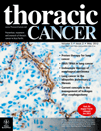
Thoracic Cancer
Innovating the future of lung cancer treatment.Thoracic Cancer is a distinguished open-access journal published by WILEY, dedicated to advancing the field of thoracic oncology. Since its establishment in 2010, the journal has emerged as a crucial platform for the dissemination of innovative research and clinical studies relating to lung cancer and other thoracic malignancies. With a commendable impact reflected in its 2023 Q2 rankings in the categories of Medicine (Miscellaneous), Oncology, and Pulmonary and Respiratory Medicine, the journal features high-quality articles that are vital for researchers, clinicians, and students aspiring to enhance their understanding of thoracic cancers. Operating out of Australia, Thoracic Cancer has embraced a commitment to open access since 2015, ensuring that vital research is readily available to a global audience. The journal's rigorous peer-review process and emphasis on novel findings make it an indispensable resource for professionals seeking to stay at the forefront of this rapidly evolving field.

Journal of Cancer Metastasis and Treatment
Exploring breakthroughs in metastasis and therapy.Journal of Cancer Metastasis and Treatment, published by OAE PUBLISHING INC, stands as a vital resource in the field of oncology, focusing on advancements and research pertaining to cancer metastasis and treatment methodologies. With an ISSN of 2394-4722 and an E-ISSN of 2454-2857, this journal aims to serve as a comprehensive platform for sharing innovative research, critical analyses, and novel findings from 2019 through 2024. As indexed in Scopus, it holds a notable Q3 ranking within its category, positioned at 240/404 and within the 40th percentile, thus reflecting its growing significance in the scientific community. Though currently not open access, the journal aspires to improve accessibility to pivotal oncology research, making it an essential tool for researchers, clinicians, and students keen on unraveling the complexities of cancer treatment and metastasis. Its commitment to promoting high-quality studies plays a crucial role in the ongoing quest to enhance patient care and outcomes in cancer treatment.
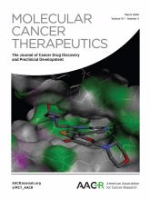
MOLECULAR CANCER THERAPEUTICS
Transforming cancer care with cutting-edge research.MOLECULAR CANCER THERAPEUTICS, published by the American Association for Cancer Research, is a premier journal dedicated to advancing the field of cancer research and therapy since 2001. With a notable impact factor reflecting its high-quality content, this journal stands out in the Q1 category for both Cancer Research and Oncology as of 2023. Researchers, clinicians, and students interested in innovative treatment strategies and molecular mechanisms can find valuable insights within its pages, bolstered by a rigorous peer-review process and a global perspective on cancer therapeutic developments. Although the journal operates under a subscription model, it provides comprehensive access to cutting-edge studies and reviews that drive forward the understanding of cancer biology and treatment modalities. The journal's impressive Scopus rankings further validate its influence within both oncology and the broader cancer research community, making it an indispensable resource for anyone committed to combating cancer through science.

Lung Cancer-Targets and Therapy
Transforming Knowledge into Effective TreatmentsLung Cancer - Targets and Therapy, published by Dove Medical Press Ltd, serves as a pivotal Open Access journal dedicated to advancing knowledge and research in the field of oncology, specifically focusing on lung cancer. Since its inception in 2010, this journal has provided a platform for disseminating high-quality research articles, reviews, and clinical studies, thereby enhancing the understanding of lung cancer mechanisms, therapies, and clinical outcomes. Currently ranked in the Q2 quartile within the oncology category and positioned at rank #80 out of 404 in Scopus, it resides in the 80th percentile of its field, reflecting its significant impact and relevance. With a commitment to promoting innovative therapies and strategies, Lung Cancer - Targets and Therapy is an essential resource for researchers, healthcare professionals, and students eager to contribute to the evolving landscape of cancer treatment and research.
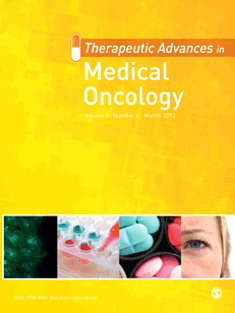
Therapeutic Advances in Medical Oncology
Catalyzing collaboration for improved cancer outcomes.Therapeutic Advances in Medical Oncology, an esteemed journal published by SAGE Publications Ltd, serves as a critical platform for disseminating high-quality research pertinent to the field of oncology. Indexed under the ISSN 1758-8340 and E-ISSN 1758-8359, this Open Access journal has made significant strides since its inception in 2009, attaining a commendable rank of #78 out of 404 in the Medicine - Oncology category of Scopus, placing it in the top 20th percentile of journals. With its category quartile of Q1 established in 2023, it underscores the journal’s commitment to advancing therapeutic approaches in oncology, making it an invaluable resource for researchers, clinicians, and students alike. Offering unrestricted access to pioneering studies since 2017, it aligns with the global movement towards open science, fostering collaboration and innovation among professionals striving to improve cancer treatment outcomes. By bridging the gap between research and clinical practice, Therapeutic Advances in Medical Oncology plays a vital role in shaping the future of cancer therapy.